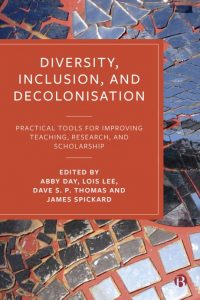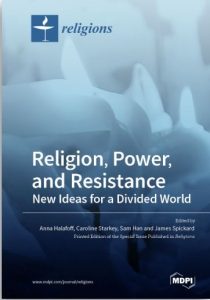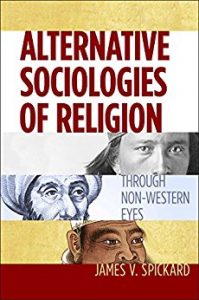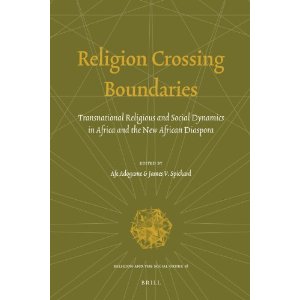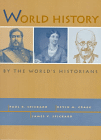This is Jim Spickard’s courseware site. Here is some information about him.
Mini-Biography
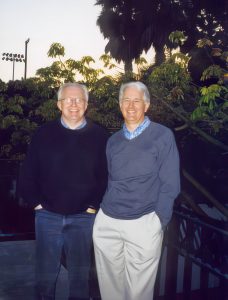
Jim (on the right) with his brother Paul, who teaches ethnic history at the University of California at Santa Barbara. |
I was born and raised in Seattle, before the “coffee era” — and before the gentrification that hit the city sometime after I fled south. I got a good education at public schools in the multi-ethnic Central District (Garfield High, class of 1966). In college, I discovered peace activism and a life-long concern for social justice. I graduated in 1970 with a B.A. in Intellectual History from Stanford and a second “degree” from the Palo Alto Police Department for “willfully and maliciously blocking a public street or sidewalk”. (I had no argument with them; they were doing their job peacefully and well.)
|
|
After college, I went right into grad school but dropped out after finishing my M.A. I worked in various theater companies in the San Francisco area for several years before finishing my Ph.D. in the Religion and Society program of the Graduate Theological Union. I taught my first college course in 1973, for the College of Notre Dame in Belmont, California. For the next 47 years, I taught courses on anthropology, sociology, philosophy, religious studies, and photography at various schools, including CND, Gavilan College, the Institute for Transpersonal Psychology, Fielding Graduate University, and — from 1989 to 2020 — at the University of Redlands. Most often, I’ve gotten jobs because I can teach research methods and design, though I prefer teaching theory, inequality, and the sociology of religion. No matter: teaching is a lot of fun. At this point, I am:
I now live just outside San Antonio, Texas. I retired early in the pandemic, as I could no longer use the interactive lets-get-out-of-the-classroom-and-learn-about-the-world style that I and my students enjoyed. Now I’m a writer. I’ve published six books, over 70 journal articles and book chapters, and a bunch of other stuff. There’s more in the works, including one new forthcoming edited collection pictured below.
|
|
|
My Books Click on a book cover to purchase a printed copy from its publisher. |
|
|
|
Diversity, Inclusion and Decolonization: The dominance of elites – crudely equated to ‘white men of the Global North’ – hits at the heart of the academic life: it distorts the knowledge universities produce; it disserves students from non-dominant groups; and it threatens the humanistic values on which the modern university is founded. The articles collected in this volume provide case studies detailing the initiatives that both individuals and institutions have taken to solve this issue in their everyday practice of teaching, writing, and research. |
|
Religion, Power, and Resistance: The essays in this book were drawn from the XIX International Sociological Association’s World Congress, Research Committee 22 on Sociology of Religion sessions, which took place in Toronto in July, 2018. They focused on religion and power, intersectional violence, social divisions, and also resistance to power, violence, and division. They included the following themes: religion and nationalism; religion and social theory; religion and diversity; religion and violent extremism; religion and gender inequality; religion and sexuality inequality; religion and environmental crises; and religion and violent and nonviolent social movements. |
Alternative Sociologies of Religion: Sociology has long used Western Christianity as a model for all religious life. As a result, the field has tended to highlight aspects of religion that Christians find important, such as religious beliefs and formal organizations, while paying less attention to other elements. Rather than simply criticizing such limitations, this book imagines what the sociology of religion would look like had it arisen in three non-Western societies. What aspects of religion would scholars see more clearly if they had been raised in Confucian China? What could they learn about religion from Ibn Khaldun, the famed 14th century Arab scholar? What would they better understand, had they been born Navajo, whose traditional religion certainly does not revolve around beliefs and organizations? |
|
Research Basics: From Design to |
Religion Crossing Boundaries: This collection of essays explores the recent growth of transnational religious networks that connect African peoples with each other and with other parts of the world. Topics include: the transnational spread of new African Christianity, transnational Pentecostalism, religion’s role in transnational migration, tri- and multi-national religious trade networks, and the consequences of having transnational religious connections for Africa itself. Volume 18 in the Association for the Sociology of Religion’s Religion and Social Order series. |
| Thinking Through Statistics: Exploring Quantitative Sociology 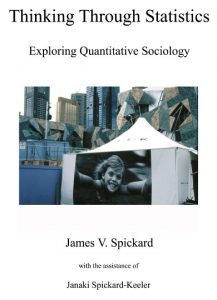 Toroverde Press, 2005Most statistics books bury you in math. This one starts with “Why Bother?” Through concrete examples, it shows how to identify the data you need, how to organize that data for analysis, how to choose the right statistical routine, and how to interpret the results. Together with the its companions software, Thinking Through Statistics leads you step by step through the process of statistical reasoning. OPEN ACCESS: Download the PDF File HERE |
Personal Knowledge and Beyond: This collection probes the transformation of anthropological practice that has taken place in recent years — especially as it applies to the study of religion. Deliberately diverse, provocative and boundary-breaking, its contributors seek new tools for understanding religion in the contemporary world. Chapters cover such topics as fieldwork among contemporary witches, the personal impact of family violence on the researcher, and the epistemological problems of studying religion in a post-colonial era |
|
World History by the World’s Historians This collection presents some of the finest historical writing ever produced: by historians from all parts of the globe, and from 3000 years ago to the present day. Designed to accompany college courses in World History and in Historiography, it was the first reader to bring non-Western historians into the canon. It includes biographies of and sample passages from 56 historians chosen for their excellence and their diversity. |
ARTICLES/INTERVIEWS/PODCASTS ABOUT MY WORK
|
|
OTHER STUFF
|
Many of my articles are posted on the University of Redlands’ “Our House” open-access archive.
|
